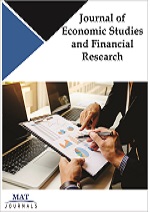A Time Series Assessment of the Impact of Government Expenditure on Private Investment and Economic Growth in Bangladesh
Keywords:
Economic growth, Government expenditure, Gross domestic product (GDP), Private investment, Vector error correcting modelAbstract
This study empirically explores the long-term relationship among government expenditure, private investment and economic growth in Bangladesh, using annual secondary time series data from 1981 to 2022. To analyze the long-run of variables, the Vector Error Correcting Model (VECM) is utilized. It is determined that government spending is statistically significant over the long term and positively correlated with economic growth. Using the PP and ADF tests, I discovered that every variable under consideration is stationary in either the level form or the first differenced form. Every variable is integrated at order one, according to the Unit Root Test, which is used to test the time series characteristic of the data before estimating the long-term relationship. Subsequently, a co-integration test was executed, revealing a single co-integrating equation between the variables. The long run dynamics are estimated using VECM. The findings showed that not every aspect of government spending can be used to explain short-term economic performance. The findings show a strong long-term correlation between Bangladesh's economic development, private investment and government spending. Additionally, the impulse response function lends credence to the finding that development spending increases Bangladesh's economic expansion.




